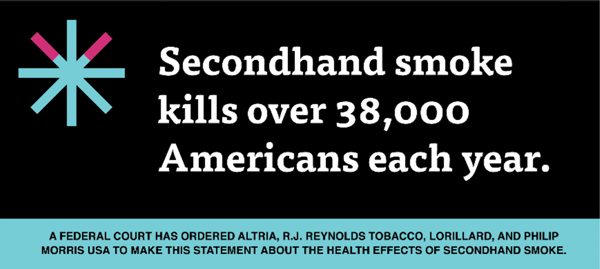The following special report was provided by the National Association of Tobacco Outlets (NATO)
The U.S. Department of Justice (DOJ) has proposed to the U.S. Federal District Court for the District of Columbia that Altria, Philip Morris USA, R.J. Reynolds Tobacco Company, and ITG Brands, LLC be required to display, for at least two-years, eighteen different point-of-sale messages in retail stores that are under contract with one or more of these manufacturers. For the manufacturers under contract with a retailer for in-store placement of cigarette products, cigarette advertising, and cigarette promotional material, then 25% of the area of point-of-sale cigarette displays for each such manufacturer needs to be covered by the point-of-sale messages. Moreover, 25 percent of any other point-of-purchase material that advertises or promotes the manufacturers’ cigarette brands must also be covered by the point-of-sale messages, whether or not a retailer has a contract with the manufacturers. A hearing on this DOJ point-of-sale message proposal is scheduled for July. The cigarette manufacturers, NATO, and the National Association of Convenience Stores are opposing this proposal.
In the event that the U.S. Federal District Court were to approve the DOJ proposal and order the communication of the messages in retail stores, the impact on retailers would be both significant and burdensome. This article provides background on the corrective statements litigation that has been on-going for almost 22 years, outlines the requirements of the DOJ proposal, and explains the legal process that is now leading up to the evidentiary hearing scheduled for July.
Background on the Litigation: In 1999, the United States government brought a lawsuit against the major cigarette manufacturers asserting claims under several federal statutes for conduct by the companies dating back to the 1950s. After a lengthy trial and appeals, the federal courts ruled that the monetary fines and other remedies sought under some of the claims were not available to the federal government under current law. Then, in 2006, the federal courts approved a remedial order that, among other things, required Altria, Lorillard Tobacco Company, Philip Morris USA, and R.J. Reynolds Tobacco Company to publish corrective statements and disseminate them through several redundant distribution channels. Over the past few years, the manufacturers have published those messages in newspapers, on TV, on their own websites, and on package onserts. Now, after various business acquisitions, Altria, Philip Morris USA, R.J. Reynolds Tobacco Company, and ITG Brands, LLC could be required to display the proposed point-of-sale messages (which differ somewhat from the corrective statements) in retail stores if the District Court approves the DOJ proposal.
Corrective Messages: There are five main corrective statement topics, with each topic including either three or four specific proposed corrective messages (which add up to the 18 messages that the DOJ proposes to be displayed in retail stores). The five main topic areas are incorporated into a preamble and then followed by the specific messages under each main topic as outlined below:
Preamble: A Federal Court has ordered Altria, R.J. Reynolds Tobacco, Lorillard, and Philip Morris USA to make this statement about the health effects of smoking.
- Smoking kills, on average, 1,200 Americans. Every day.
- More people die every year from smoking than from murder, AIDS, suicide, drugs, car
crashes, and alcohol, combined. - Smoking causes heart disease, emphysema, acute myeloid leukemia, and cancer of the
mouth, esophagus, larynx, lung, stomach, kidney, bladder, and pancreas. - Smoking also causes reduced fertility, low birth weight in newborns, and cancer of the
cervix.
Preamble: A Federal Court has ordered Altria, R.J. Reynolds Tobacco, Lorillard, and Philip Morris USA to make this statement about the addictiveness of smoking and nicotine.
- Smoking is highly addictive. Nicotine is the addictive drug in tobacco.
- Cigarette companies intentionally designed cigarettes with enough nicotine to create and
sustain addiction. - It’s not easy to quit.
- When you smoke, the nicotine actually changes the brain—that’s why quitting is so hard.
Preamble: A Federal Court has ordered Altria, R.J. Reynolds Tobacco, Lorillard, and Philip Morris USA to make this statement about low tar and light cigarettes being as harmful as regular cigarettes.
- Many smokers switch to low tar and light cigarettes rather than quitting because they
think low tar and light cigarettes are less harmful. They are not. - “Low tar” and “light” cigarette smokers inhale essentially the same amount of tar and
nicotine as they would from regular cigarettes. - All cigarettes cause cancer, lung disease, heart attacks, and premature death—lights, low tar, ultra lights, and naturals. There is no safe cigarette.
Preamble: A Federal Court has ordered Altria, R.J. Reynolds Tobacco, Lorillard, and Philip Morris USA to make this statement about designing cigarettes to enhance the delivery of nicotine.
- Altria, R.J. Reynolds Tobacco, Lorillard, and Philip Morris USA intentionally designed
cigarettes to make them more addictive. - Cigarette companies control the impact and delivery of nicotine in many ways, including
designing filters and selecting cigarette paper to maximize the ingestion of nicotine,
adding ammonia to make the cigarette taste less harsh, and controlling the physical and
chemical make-up of the tobacco blend. - When you smoke, the nicotine actually changes the brain—that’s why quitting is so hard.
Preamble: A Federal Court has ordered Altria, R.J. Reynolds Tobacco, Lorillard, and Philip Morris USA to make this statement about the health effects of secondhand smoke.
- Secondhand smoke kills over 38,000 Americans each year.
- Secondhand smoke causes lung cancer and coronary heart disease in adults who do not
smoke. - Children exposed to secondhand smoke are at an increased risk for sudden infant death
syndrome (SIDS), acute respiratory infections, ear problems, severe asthma, and reduced lung function. - There is no safe level of exposure to secondhand smoke.
DOJ Proposed Signs for Each Point-of-Sale Message: The DOJ proposal includes a multi-color design for each sign to communicate the eighteen different messages. The signs consist of a magenta and aqua blue stylized asterisk, the message in white text on a black background, and the preamble in black text on an aqua blue background. Below is an example of one of the proposed DOJ point-of-sale signs:

Each manufacturer is required to ensure that the messages cover 25 percent of its cigarette display territory on each “set display” at retail stores. A “set display” refers to any cigarette merchandising space in a store or on its property that is visible to consumers. Set displays generally have high visibility, and are often, but not always, located behind the counter and consist of any rack, shelving, display, or fixture including any canopy or header that is used in whole or in part to merchandise cigarettes that are visible to consumers.








